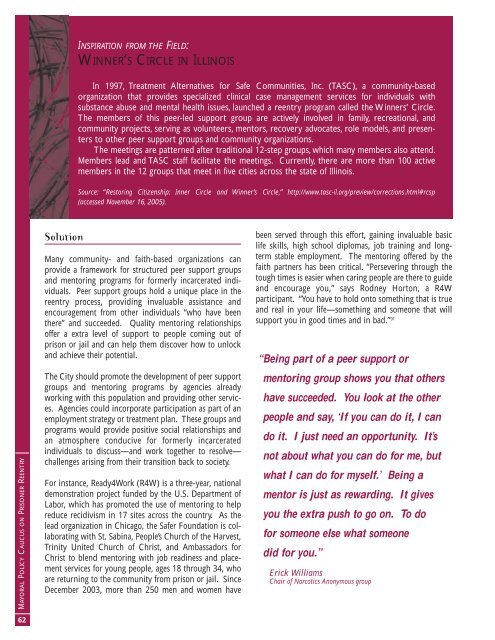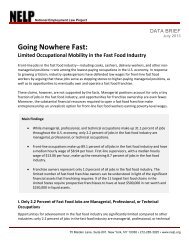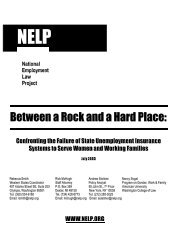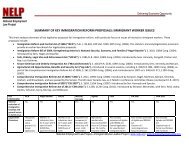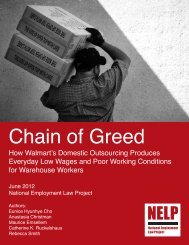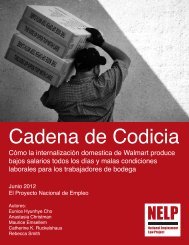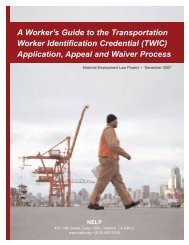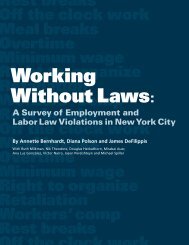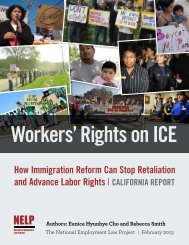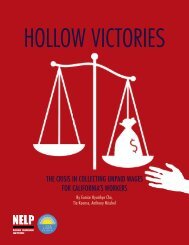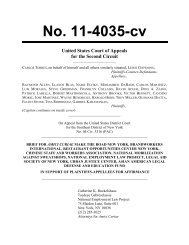Rebuilding Lives. Strengthening Communities.
Rebuilding Lives. Strengthening Communities.
Rebuilding Lives. Strengthening Communities.
Create successful ePaper yourself
Turn your PDF publications into a flip-book with our unique Google optimized e-Paper software.
INSPIRATION FROM THE FIELD:<br />
WINNER’S CIRCLE IN ILLINOIS<br />
In 1997, Treatment Alternatives for Safe <strong>Communities</strong>, Inc. (TASC), a community-based<br />
organization that provides specialized clinical case management services for individuals with<br />
substance abuse and mental health issues, launched a reentry program called the Winners’ Circle.<br />
The members of this peer-led support group are actively involved in family, recreational, and<br />
community projects, serving as volunteers, mentors, recovery advocates, role models, and presenters<br />
to other peer support groups and community organizations.<br />
The meetings are patterned after traditional 12-step groups, which many members also attend.<br />
Members lead and TASC staff facilitate the meetings. Currently, there are more than 100 active<br />
members in the 12 groups that meet in five cities across the state of Illinois.<br />
Source: “Restoring Citizenship: Inner Circle and Winner’s Circle,” http://www.tasc-il.org/preview/corrections.html#rcsp<br />
(accessed November 16, 2005).<br />
MAYORAL POLICY CAUCUS ON PRISONER REENTRY<br />
62<br />
Solution<br />
Many community- and faith-based organizations can<br />
provide a framework for structured peer support groups<br />
and mentoring programs for formerly incarcerated individuals.<br />
Peer support groups hold a unique place in the<br />
reentry process, providing invaluable assistance and<br />
encouragement from other individuals “who have been<br />
there” and succeeded. Quality mentoring relationships<br />
offer a extra level of support to people coming out of<br />
prison or jail and can help them discover how to unlock<br />
and achieve their potential.<br />
The City should promote the development of peer support<br />
groups and mentoring programs by agencies already<br />
working with this population and providing other services.<br />
Agencies could incorporate participation as part of an<br />
employment strategy or treatment plan. These groups and<br />
programs would provide positive social relationships and<br />
an atmosphere conducive for formerly incarcerated<br />
individuals to discuss—and work together to resolve—<br />
challenges arising from their transition back to society.<br />
For instance, Ready4Work (R4W) is a three-year, national<br />
demonstration project funded by the U.S. Department of<br />
Labor, which has promoted the use of mentoring to help<br />
reduce recidivism in 17 sites across the country. As the<br />
lead organization in Chicago, the Safer Foundation is collaborating<br />
with St. Sabina, People’s Church of the Harvest,<br />
Trinity United Church of Christ, and Ambassadors for<br />
Christ to blend mentoring with job readiness and placement<br />
services for young people, ages 18 through 34, who<br />
are returning to the community from prison or jail. Since<br />
December 2003, more than 250 men and women have<br />
been served through this effort, gaining invaluable basic<br />
life skills, high school diplomas, job training and longterm<br />
stable employment. The mentoring offered by the<br />
faith partners has been critical. “Persevering through the<br />
tough times is easier when caring people are there to guide<br />
and encourage you,” says Rodney Horton, a R4W<br />
participant. “You have to hold onto something that is true<br />
and real in your life—something and someone that will<br />
support you in good times and in bad.” 91<br />
“Being part of a peer support or<br />
mentoring group shows you that others<br />
have succeeded. You look at the other<br />
people and say, ‘If you can do it, I can<br />
do it. I just need an opportunity. It’s<br />
not about what you can do for me, but<br />
what I can do for myself.’ Being a<br />
mentor is just as rewarding. It gives<br />
you the extra push to go on. To do<br />
for someone else what someone<br />
did for you.”<br />
Erick Williams<br />
Chair of Narcotics Anonymous group


